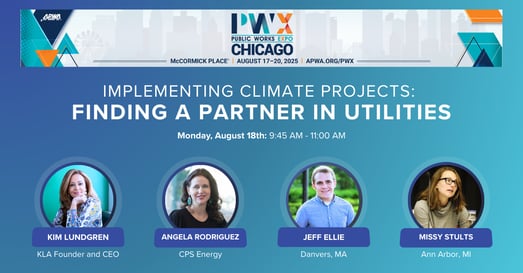From the New England APWA and national PWX conferences to the Northeast Public Power Association, utility partnerships was a summer theme for KLA
This summer, I spoke on panels at the New England APWA and the national PWX conference on the topic of local governments – public works departments, specifically, but this applies across the city, town or county -- leveraging strategic partnerships with utilities to support efforts like building and vehicle electrification and solar.
I was joined on the panels by our clients and partners, including: Marybeth Martello of Wellesley, MA; Jeff Ellie of Danvers, MA; Angela Rodriquez of CPS Energy in San Antonio; and Missy Stults of Ann Arbor, MI.
.jpeg?width=433&height=325&name=Image%20(40).jpeg)

To establish that valuable utility relationship, it’s critical that we understand how utilities operate and the role they can play in faster, more effective pursuit of climate goals.
We captured some of the best practices we’ve seen around utility partnerships in this one-pager. It includes:
- Utility Engagement: Inviting utility representatives to be part of climate action planning; partnering with them to create energy coaching programs
- Incentive and Outreach Programs: Electrification outreach campaigns; home energy labeling programs
- Clean Energy Transition: Generating more wind and solar power; Community Choice Aggregation
- Sustainable Energy Utilities: Comparing two models in Washington, DC and Ann Arbor
Ann Arbor's Sustainable Energy Utility (SEU) model is truly innovative. SEUs are community-led utilities that are supplemental to existing utilities and offers an optional path towards achieving sustainability and climate goals through energy efficiency, renewable energy, battery storage and other local priorities. The Ann Arbor SEU, approved by voters in November 2024, is designed to achieve local energy resilience and decarbonization as part of the city's A2Zero climate plan. It is municipally owned and controlled, led by city staff with a voluntary opt-in model for residents and businesses. The goal is to scale up to meet 75% of the city's energy needs.
Our one pager breaks down the basics, but the Ann Arbor website has more details as does some of the media coverage.
Download the Utility Partnerships One Pager.
.jpeg?width=388&height=291&name=shared%20image%20(1).jpeg)
Meanwhile our Director of Climate Analysis, Mike Steinhoff, just got back from the Northeast Public Power Association (NEPPA) conference in Burlington VT, where the sessions underscored the many challenges faced by municipal utilities that will require more partnerships and creative problem solving to maintain progress on the climate targets set by their broader community.
Whether keeping up with the latest advances in cold-climate heat pumps to combat misinformation or incorporating slow-downs of clean energy deployment into future projections -- collaboration will be key to weathering the next few years successfully.
Mike (shown here with Becca with SELCO in Shrewsbury, MA, and Clint Allen with Danvers, MA) shared with the KLA team his biggest takeaway from the conference overall: Leveraging networks adds power to any strategy. It works across a range of issues including procuring renewable energy at scale or coordinating first-class response capabilities through a coordinated and trained mutual-aid program. It was heartening to see the collaborative spirit on full display.



